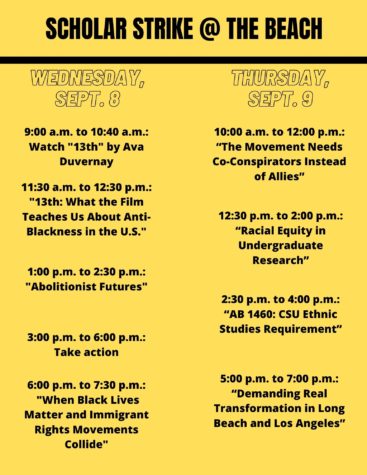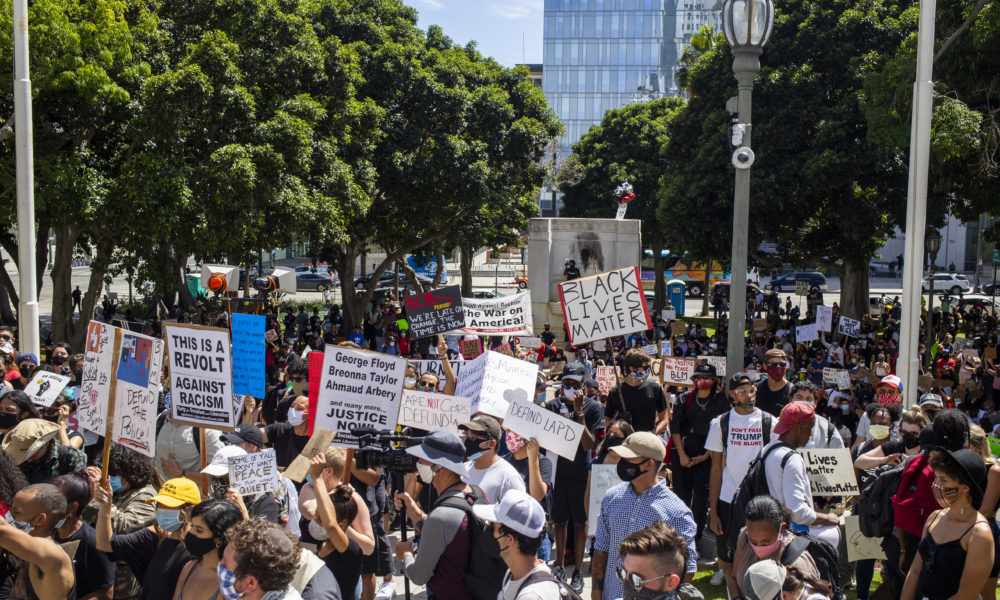In response to the rapidly evolving “scholar strike” set for Sept. 8 and 9, the administration at Long Beach State has shown explicit support of faculty participation in the nationwide movement to promote anti-racism on campus and across the country.
According to the school’s website, the scholar strike is being described as “Speaking Out: Supporting Anti-Racism at CSULB and Beyond.” The university’s official plan for the two-day event has Tuesday’s theme set as “What is Race? What is Anti-Blackness? How do they operate?” and Wednesday’s theme as “Dismantling Racism.”
Let me talk about Scholars Strike, #ScholarStrike which is slated for September 8-9, immediately after Labor Day.
If you want to sign up, do so here https://t.co/wi5HBwBvLGThanks to @TattoedProf for helping me to organize and set up our apparatus!
— ProfB (@AntheaButler) August 27, 2020
Started by Anthea Butler, associate professor of religious studies and Africana studies at the University of Pennsylvania, and co-facilitated by Kevin Gannon, professor of history at Grand View University in Iowa, the strike is set to occur for the 48 hours following Labor Day in an effort to accommodate participating professors who work two-day teaching schedules.
During Tuesday and Wednesday classes next week, professors and administrators are encouraged to stray from traditional duties and course material to instead use the allotted time to “foster discussions and promote” teachings focused on injustice in America related to policing and violence against communities of color, according to the school’s official statement.
“Faculty members at CSULB are encouraged to consider pausing classes on September 8 and 9 to provide the opportunity for students and faculty members to participate in educational opportunities focused on anti-racism,” the statement read. “A number of your colleagues have been working hard to develop programming for these days, and to compile and curate readings, films, videos and podcasts that address anti-racism.”
Participants will be able to engage in the movement by offering alternative programming options for students, including 10-minute YouTube video lessons discussing racism, and making use of resources provided by the strike’s organizers.
CSULB’s website now includes a page with information pertaining to the strike as well as recommended media focused on topics of race, racism and racial inequity, featuring Justice Delayed, a short film created by CSULB students, along with several other films, videos, podcasts and readings.
“#ScholarStrike at its core is about standing up against the racism and racial injustice that is happening right now in America, especially but not limited to African Americans, educating our students and the public about radicalized violence and working for a just society,” Butler said on Twitter. “It’s something we need to do if we are [going] to see structural and lasting change in America regarding racism, policing and injustice.”
One of CSULB’s strike organizers, Maulana Karenga, Africana studies department chair, said he is participating in solidarity with “our people and the struggle in the streets across the country” and poses a challenge for the university to “contribute meaningfully, measurably and continuously to the struggle against racism on campus and in society.”
“It is our struggle, another battlefront of our larger struggle as Black people to end police violence and systemic racism,” Karenga said. “It is also the struggle of people of color as a whole and for all people who value and support freedom from oppression, justice and equity for all. The university is also a ground of struggle and we’re obligated to struggle there and in society.”
He feels the administration should implement collaborative initiatives for faculty to foster a “collegial and welcoming climate our students, faculty and staff want and deserve” on campus.
Per the page’s event calendar, Tuesday’s programming begins at 9 a.m. with a screening of the Netflix film 13th, directed by Ava DuVernay. Following this, there will be a discussion from 11:30 a.m. to 12:30 p.m. titled “13th: What the Film Teaches Us About Anti-Blackness in the U.S.” that includes guest presenters.
From 12:45 p.m. to 1:45 p.m., there will be a discussion titled “I Am Not Your Negro: James Baldwin’s Words & Their Impact” as well as a student teach-in by ENGL 375, or U.S. ethnic writers. There will also be a discussion from 1 p.m. to 2:30 p.m. on “Abolitionist Futures,” featuring several faculty presenters.
At 3 p.m., there will be a session focused on taking action in “opportunities for direct participation” that encourages voting, census participation and writing to representatives. Students are also encouraged to join several organizations including Black Lives Matter, the Black Student Union, La Fuerza, Students for Quality Education, the Anti-Racist Coalition at the Beach and Showing Up for Racial Justice.
Also at 3 p.m., a march to “End Police Violence” is set to take place at Long Beach’s Recreation Park.
Following this, participants are encouraged to register for a teach-in meeting from 6 p.m. to 7:30 p.m. regarding “When Black Lives Matter and Immigrant Rights Movements Collide.”
“I look forward to, and work and struggle for, victory against police violence and systemic racism which can only truly and fully take place with a radical reconception and reconstruction of society,” Karenga said. “This means first recognizing each people and culture as a unique and equally valid and valuable way of being human in the world and worthy of the highest respect. It also means moving from the conception of society as a White-finished product to a conception which recognizes and respects the fact that it is an unfinished, ongoing, multicultural project.”
The events for Wednesday, Sept. 9 begin at 10 a.m. with a session titled “The Movement Needs Co-Conspirators Instead of Allies” that features several BLM members from the Long Beach chapter. Immediately following, a session on “Racial Equity in Undergraduate Research” will take place from 12:30 p.m. to 2 p.m.
From 2:30 p.m. to 4 p.m., there will be a discussion on Assembly Bill 1460, the California State University ethnic studies requirement. Wednesday’s schedule ends with a session on demanding transformation within Long Beach and Los Angeles to “dismantle the racist carceral system,” from 5 p.m. to 7 p.m.

“I am impressed with how our faculty are manifesting the aims of the Scholar Strike,” President Jane Close Conoley said. “CSULB faculty always think out of the box and keep a focus on students rather than making it just about themselves.
Students, faculty and staff are encouraged to participate in national conversations about these issues via social media by following Butler’s hashtag #ScholarStrike.
News of the strike reached CSULB when David Shafer, history department chair, decided to take a “tangible” stand on racial inequity rather than just making a statement of sympathy. Shafer did this by sending an email to the College of Liberal Arts faculty on Aug. 28, declaring his participation in the strike along with Karenga, Rigoberto Rodriguez, Chicano and Latino studies department chair, Barbara LeMaster, director of American Sign Language Linguistics and Deaf Cultures, Teresa Wright, political science department chair and Kristine Zentgraf, sociology department chair.
“I don’t have any illusions that it’s going to lead to monumental change, especially when it’s academics who are doing it,” Shafer said. “I mean it’s possible that some will give it a great big shoulder shrug if it gets any publicity, or people are going to say, ‘Well what do you expect, it’s a bunch of ivory tower intellectuals.’ But the point is it starts something, it moves us away from statements, it moves us to some sort of action, and this is where it becomes impactful.”
Butler initially posted a Tweet promoting the strike that led Gannon to reach out to her on Twitter, and the two eventually met on Zoom to collaborate on the project.
I would be down as a professor to follow the NBA and Strike for a few days to protest police violence in America.
— ProfB (@AntheaButler) August 26, 2020
With thousands of participant signatures, the strike is meant to be a deviation from the curriculum and a disruption from “business as usual” that Gannon hopes will be a chance for scholars to put their skills to work in a real-world setting.
“If I am not answering work emails for two days, what does that disruption mean, and what message is being sent by the allocation of my skills and labor to this public project?” Gannon said in an email. “And while this isn’t a mass demonstration in the streets, it is a disruption, a collective stand taken by those of us in higher education to hold ourselves, our institutions and our communities accountable to the ideals they supposedly stand for.”
Butler said on Twitter that she understands some individuals may place their jobs at risk by formally participating, such as faculty on tenure track or within union agreements, and maintained that those able to join should do so.
Initially, CSULB administration did not explicitly encourage faculty to participate in the strike, according to Shafer, but instead provided “conceptual and tangible support” for the alternative programming and “would offer logistical support.” The CLA Dean’s office expressed concrete support for the movement in response to Shafer’s email, which he said “means a lot.”
Shafer hopes the College of Liberal Arts acts as “a lead role in academia” to inspire other liberal arts colleges and departments to participate.
“Their support emboldened me to think that no matter what happens, if somebody chooses to participate, that there would never be any retaliation or retribution or that they have anything to worry about,” he said.
The significance of the strike occurring the day after Labor Day, he said, relates to the pay disparity faced by working class people of color.
Shafer maintained that his email to the Beach’s CLA faculty was not meant to pressure anyone to participate, but instead he felt it was important for professors to be aware of the strike to determine if they wanted to engage.
“We see our efforts as simply part of a larger national and international effort to work for justice and for Black lives,” Gannon said. “You start where you are, and for us, this is the place.”
Karenga said he hopes the strike will foster an increased understanding of the importance of voting and census participation, as well as support of AB 1460.
He also hopes participants will build an “interest in reimaging and reconstructing” a “multicultural and good society.”
“What happens after the strike and what each of us does to actively support, work and struggle for racial justice and social justice and to end police violence and systemic racism will be decisive,” Karenga said. “For let us remember that the struggle is a long, difficult, dangerous and demanding one.”





Pingback: IN PHOTOS: 'People were murdered and accountability is necessary' - Daily Forty-Niner
Pingback: Why Labor Day is more important now than ever - Daily Forty-Niner